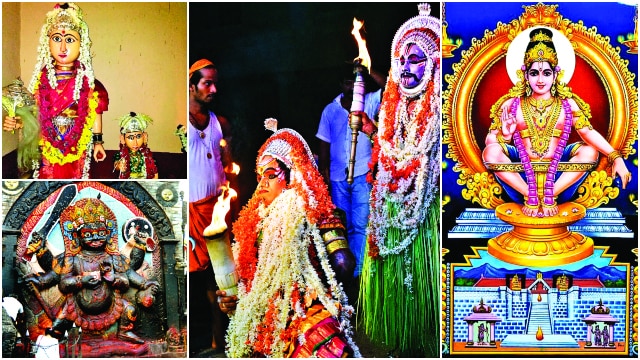
Ranjith Divakar works with an iron and steel major in Bhadravati, Karnataka, and his wife Varsha is a manager with a Mumbai-based beauty salon. They have both sought leave from work to attend a puja of their family's bhuta (guardian ghoul/spirit) at their Karkala home. Divakar says bhutas are worshipped in every village and home across Udupi and Dakshina Kannada districts in Karnataka, and Kasargod district in Kerala. "While Christianity or Islam converts don't worship them directly, even they believe in their powers and send offerings," says this IT engineer, citing neighbours and family friends who do so.
Across this region, the bhutas are not feared instead considered family and invoked in good and bad times alike. "They protect family, cattle and pets against disease/illness. We seek their blessings for marriage, for business, before journeys, for a good crop/catch (for fishermen)," explains Divakar, whose father organised a special puja to appease the family bhuta before a land dispute came up in court. "Once we enter into an understanding (rooster slaughter or special puja) with a bh uta for help, we have to fulfil it as the bhutas punish those who renege."
Divakar admits being cynical once upon a time. "I was simply practicing it since my parents already were. But at some point, I took over family tradition as the son and head of the family."
While some spirits are totemistic like Nadigone (bull) or Panjurli (tiger), others are the fiery ganas of Lord Shiva like Guliga or Veerabhadra. There are several mother goddesses like Mariamma, Ullalti, Lakkesiri, Jumadi among others, invoked for protection. (Unlike Brahminical and Vedic Goddesses, these are not consorts of Hindu Gods but have fiercely independent identities of their own), local heroes of yore like Koti – Chennaya, Kalkuda-Kallurti, Siri, Koddabbu, Koraga-Taniya, or serpent spirits or Nagas. While Divakar is going home for a kola (this annual festival of the spirit sees it possess a medium to make predictions for the year ahead), some spirits are worshipped with agelu (feast to spirits), bandi (cart procession), nema (offering to Koti Chennaya), tambila (offering to serpent gods), jatre (festivals at places of worship) and kenda seve (walking on live embers).
Although mainstream Hinduism is dominated by the Vedas, Upanishads, Puranas, Ramayana and Mahabharata, traditions like the one in Tulunadu have always co-existed across India, anthropologist Shridhar Tilve points out. While angrily opposed to the word pagan (which he calls derogatory), he insists these traditions pre-date mainstream Hinduism, kept alive by the largely Shaiva peninsular South and the East of the subcontinent.

[(From left to roght) Kola bhutas that IT engineer Ranjith Divakar worships at his village in Kerala; Kalbhairav bhuta; theatrical performance of Kalkuda Kallurti kola; Ayyappan]
Praveish Vishwanath Aiyar, who teaches Culture Studies at Khalsa College, shares information on some practices and beliefs from up north in Maharashtra: "Village gods protecting fields/crop are venerated through the ages. The tiller maintains this idol with an annual remuneration kept aside for the pooja punaskaram. Besides this, Mariamman is the South Indian mother goddess, predominant in the rural areas of Tamil Nadu focuses on bringing
rains and curing diseases like chicken pox and small pox. She is worshipped in accordance with the local agamas by non-Brahmin priests by a society that venerates femininity."
He explains how Aiyanar/Sasta is the primary guardian folk deity in Tamil Nadu. "In Kerala, the name is Ayyappan. The Tamil word Ayyanar is derived from the root word Ayyan, the Tamilised version of the Sanskrit root arya, meaning respectable." He points out how recently, the prosperous Muslim area in Tiruchi, Inam Kulathur (famous for its biryani) celebrated the Kumbabhisekham of the Aiyanar temple in the heart of its township."
Up north in the temple town of Ujjain, devotees offer liquor to the presiding deity, Kalbhairav. The chief priest Gopalkrishna Chaturvedi has witnessed leading officials, bureaucrats actors and others visit to the shrine to offer liquor.
"The government has set up its own official vends to sell liquor outside the temple," says Chaturvedi.
From central India as we move east to Odisha, Bengal, Assam and Manipur, where occult worship is an integral part of the religious tradition, we find tantricism being the central theme. Like in the roofless 64-yogini temple at Hirapur, off Bhubaneshwar in Odisha. "When believers unburden themselves to these bhutas/goddesses/forces, they find a release of sorts. Given the hard lives the poor lead in rural India, this often becomes their only outlet in the face of social apathy," explains Tilve.
Faith can be stranger than fiction.